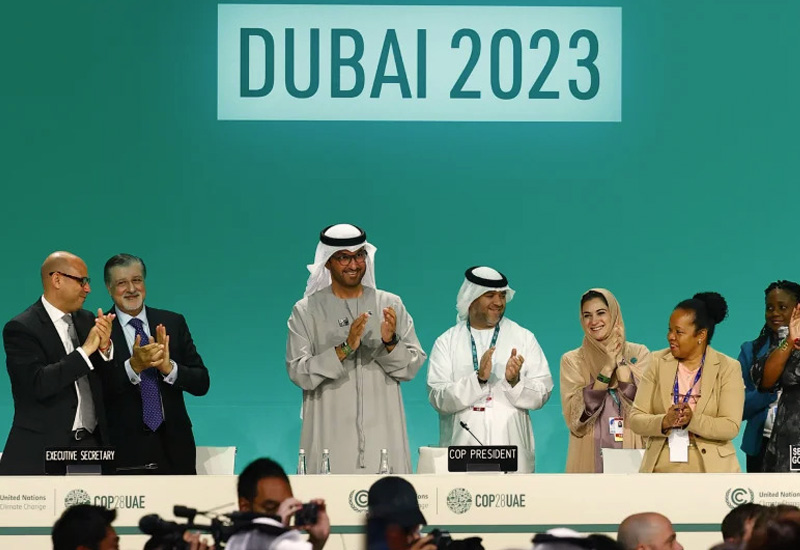2023 has been a year dominated by topics like AI and inflation. Despite these new trends, the public perception of the climate crisis has been heightened by the exceptional summer just experienced in much of the northern hemisphere, which saw weather and climate records tumbling.
Against this backdrop, COP28 in Dubai was closely watched by media outlets. To see how it influenced the wider sustainability debate, we analysed 1,195 English-language articles published in top-tier media outlets in the last month. Here are our main takeaways:
1. COP is a dangerous place for corporate comms
For years, companies have leveraged the COP summits as platforms to showcase their environmental commitments and promote their green credentials, most notably by making voluntary pledges and demonstrating their readiness to adopt more sustainable practices.
However, our recent analyses suggest that the COP platform may no longer be as effective for this kind of corporate environmental promotion. Year after year, the COP has become more controversial, with increasing scepticism and criticism from the media.
Such criticism often frames the COP as a venue for greenwashing, where companies and countries make grand environmental pledges that are incongruent with their actions. Last year, we found that the sponsorship deal between the climate conference and Coca-Cola, which has been described as the “world’s top polluter” by environmental groups, became the centre point of the media conversation.
And now, the conference has been controversial from the outset with the UAE being accused by many media outlets of using the event as an opportunity to greenwash their oil production by hosting it. This overarching sentiment made Greenwashing the main topic in the debate:
Furthermore, COP28 President Sultan Ahmed Al Jaber, who is also the CEO of oil firm ADNOC, has been embroiled in a scandal after arguing that there is no science indicating that fossil fuels need to be phased out – a controversial statement that generated so much media resonance that he became the most influential spokesperson in the debate:
To make the scandal worse, there were reports that ADNOC may increase its production of oil by 42% by 2030, which made the company disproportionately prominent in the conversation:
Another controversy that made many media headlines was the fact that around 2,500 fossil fuel lobbyists have been granted access to the conference, more than any other COP. This record number was more than the total attendees from the 10 countries most vulnerable to climate change.
In this regard, companies like Shell, Chevron, ExxonMobil, TotalEnergies and Equinor were widely criticised for sending their representatives to greenwash their companies’ reputations and to advance a fossil-fuelled agenda at the expense of frontline communities. The mere participation in COP exposed oil majors to greenwashing allegations, which effectively killed any messaging they tried to put forward.
2. Climate finance and green tech won’t win any more PR points
Climate finance – the investments in green energy solutions – was as another major coverage driver, not least because green tech trends like carbon capture have been getting a lot of attention lately.
A company that gained attention in this space was BP, which plans for about 50% of its capital spending to be on transition businesses by 2030. However, many publications noted that recently it has slowed down its emissions reduction plans and scaled back its move away from oil and gas. Meanwhile, the two US supermajors, Chevron and ExxonMobil, focused their communications on low-carbon technologies such as hydrogen, carbon capture and storage and biofuels.
However, a common narrative emerging from COP28 is the growing scepticism towards green technology solutions as substitutes for the more fundamental task of cutting emissions.
In fact, the International Energy Agency (IEA) became the most influential NGO in the media discussion, as it has was quite forthright in stating that green investments such as new carbon capture projects by oil and gas companies are not adequate replacements for reducing emissions.
In the meantime, key spokespeople like U.N. Secretary-General Antonio Guterres were also widely cited as saying that success of the COP28 climate summit would be an agreement on the need to “phase out” fossil fuels.
The new, uncompromising stance on the complete phasing out of fossil fuels signals a transformative shift in the landscape for PR and communications in the energy sector. Simply promoting trendy green tech solutions is no longer adequate for earning easy PR points; instead, there is a growing demand for more substantive, holistic approaches to sustainable energy practices.
3. Methane emerged as new narrative
Our media analysis also found that methane, a potent greenhouse gas, is becoming an increasingly prominent topic in discussions around climate change and sustainability.
A number of journalists noted that pledges made by the likes of Saudi Aramco, Petrobras, Shell, TotalEnergies and BP to reach near-zero methane emissions and end routine flaring by 2030 represent a significant step.
In addition, some food and drink companies like Danon, Bel Group, General Mills, Lactalis, Kraft Heinz and Nestle gained media exposure as they pledged to begin reporting their methane emissions by mid-2024 and to write methane action plans by the end of that year.
However, many media outlets were quick to criticise these pledges, calling them a smokescreen to hide the reality that we need to phase out oil, gas and coal, as they address symptoms rather than the source of the problem.
The media’s increasing focus on methane emissions signals a new direction in the environmental narrative, one that PR and communications professionals need to adapt to. Historically, many campaigns have concentrated on carbon dioxide reduction, but the rising prominence of methane as a potent greenhouse gas in media discussions necessitates a broader, more inclusive approach to climate communication strategies.
